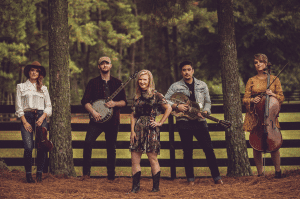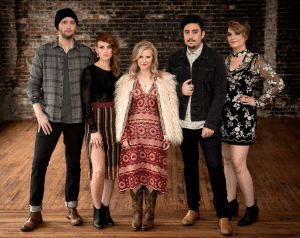Just When You Thought "Americana" Was Dying

Ahhhhh... The rise of "Americana" music movement! Over the last 20 years Americana has proved itself to be a genre that is often hard to define. Americana typically makes us think of Mumford and Sons (who obviously aren’t born Americana), the Lumineers, The Civil Wars and The Band Perry. It’s usually described as music where folk meets blues meets blue-grass meets rock and roll, and throw in an electric keyboard if you’re so inclined. But what happens when it meets classic rock in a Fleetwood Mac-meets-Neil Young kinda way. It’s been a few years since we had a major Americana band that broke through the mold and actually “made it”.
So, what’s next for the Americana clan? Meet New Reveille, a 5-piece (cello, guitar, banjo and violin) wonder. Pushing through industry molds and winning awards for their first video “Babylon". Unlike many independent artists lead singer, Amy Kamm, claims their plight has been an easy one. “Things serendipitously fell into place for us, rather than being forced. The band formed around the music, rather than the band existing first,” says Amy, “It has always felt like we have tapped into something that is bigger than just us.” This band is on the yellow brick road to becoming a house hold name. We sat down with principal songwriter, Daniel Cook, to talk about the creation of the band and where they’re headed next. Grab your banjo and read up.
I know that musical categories tend to put off artists. But Nashville is teaming with categories these days. Americana music has been defined as “roots-oriented sound that lives in a world apart from the pure forms of the genres upon which it may draw.” Would you call yourselves an “Americana” group?
Your songs bear blues, bluegrass, folk roots, all sort of anointed by the classic stings. (The bowing techniques of Kaitlin and Autumn suggest classical training.) What exactly are your roots? How does this “New awakening” stand apart musically from those roots?
I think of Americana as a broad category covering a lot of traditional American music, including folk, country, blues, rock, bluegrass and old-time Appalachian music. What we do is meld of all those styles. So, I’d say our music falls under the umbrella of Americana. It’s basically our own blend of different roots music. But we bring in some classical as well as pop influence as well. In the past, we’ve somewhat jokingly characterized our music as “where the mountains meet the swamp.” I think that’s still true to an extent, but now we’ve brought in a touch of the classic rock vibe, sort of a Fleetwood Mac-meets-Neil Young feel. Part of this evolution has been unintentional, and just happened spontaneously. And I think that’s part of the beauty of it.
Critics have noted the depth of your lyricism. The song “Miracle” is a haunting song story. Is this autobiographical at any level? The tightness of your harmonies, both vocal and string, on “Miracle” counterbalance the seriousness of the theme. Do one of you arrange or is it always a collaboration?
We’ve all experienced loss in some form or another. Some more than others. If you haven’t, you will eventually. And that’s part of life. “Miracle” is about growing through loss and learning to move on, appreciating what precious time we have with those we love.
As far as writing, it’s usually me, George or Autumn who brings in an initial idea. Then we work together as a group to iron out the instrumentation and arrangement. We’ll often get together at my home studio to record it. And we’ll see if Amy is feeling it, and figure out what might need to change with phrasing, etc. Amy will often experiment with melody changes, and when she does, it's invariably better. And there might be several iterations of all this before we land on the final version of a song.
Sometimes we’ll talk lyrics, sometimes not. Lyrics are often pretty personal. And it's cool when listeners can take away their own meaning. Personally, hearing a writer's explanation of a song's meaning will sometimes ruin it for me. There's gotta be something left to ponder. But it also has to be relatable in some way. When writing, sometimes a conversation about lyrics can help focus a song’s meaning in a way that benefits it. Other times it can dilute or taint it. But we can usually gauge pretty early on which it is. If the collaborative approach is working, we'll stay on that path. If not, we'll defer back to whoever's idea it was.
As far as harmonies, Kaitlin and Autumn just seem to instinctively know what to do to back Amy up, and when to do it. But we’ll sometimes make changes in the demoing process.
Things are really popping for you right now. You’ve signed with “Loud and Proud” records after self-releasing your first album. Apart from the obvious marketing edge, what do you sense your partnership with Tom Lipsky brings to your musical table?
Tom has decades of experience in the music industry and he knows the business. He’s a very driven guy and knows how to connect the dots. But apart from the business end of things, and having great instincts about which opportunities to pursue, something we liked early on was that he’s a music fanatic. So, there’s always this positive energy around. And every decision is collaborative. It really is a partnership. And we’re excited about where it’s all headed.
At the same time, you are launching your new album you are launching your PledgeMusic store. I noticed that you will be selling hand written lyrics. Is that the plan then? Are you seeing the store as not only a retail gig, but an expansion of what you are doing creatively?
PledgeMusic is cool because it lets us connect with a large community of music fans and develop a relationship with them. We like it as a platform for offering merch and interactive experiences. We’re doing a diary of behind-the-scenes, personal footage in the Access Pass updates that tell more about us as individuals. After the album releases, our page will continue to stay open with ongoing updates and new products. We want it to be a “destination” that keeps us all connected. We'll also probably offer more of George's New Reveille artwork at some point. We're not sure yet. But there are a lot of options and that's what we like about it.

On your website you note that Daniel’s grandfather bugled Reveille to awaken the troops, hence the name. A different tune called Reveille is also bugled at the beginning of a new horse race. Tell us about your new album. How does it represent artistically a new level for you?
We’ve made a lot of discoveries over the last few months while making this record. I mentioned the “evolution” earlier. And we’re really excited about that—especially being able to bring in the sort of retro feel, which somehow also sounds very modern when blended with the sound we already had. And our partnership with Loud and Proud has afforded us the opportunity to work with some pretty amazing people. Recording with producer-engineer Ben Fowler has been a blast. He has a keen ear and great instincts. He brought in some talented session players—Fred Eltringham on drums, Mark Hill on bass, and Gordon Mote on keys. These folks got very invested in the music and contributed a lot creatively. And the band was able to co-write a few songs with Kip Raines and Jim Photoglo. Plus, I think just having dedicated time and space to immerse ourselves in this project has helped us take it to new heights. We're excited about the way it's all grown and can't wait for the world to hear it.
Watch their videos and read more about their story and album here: http://newreveille.com/




